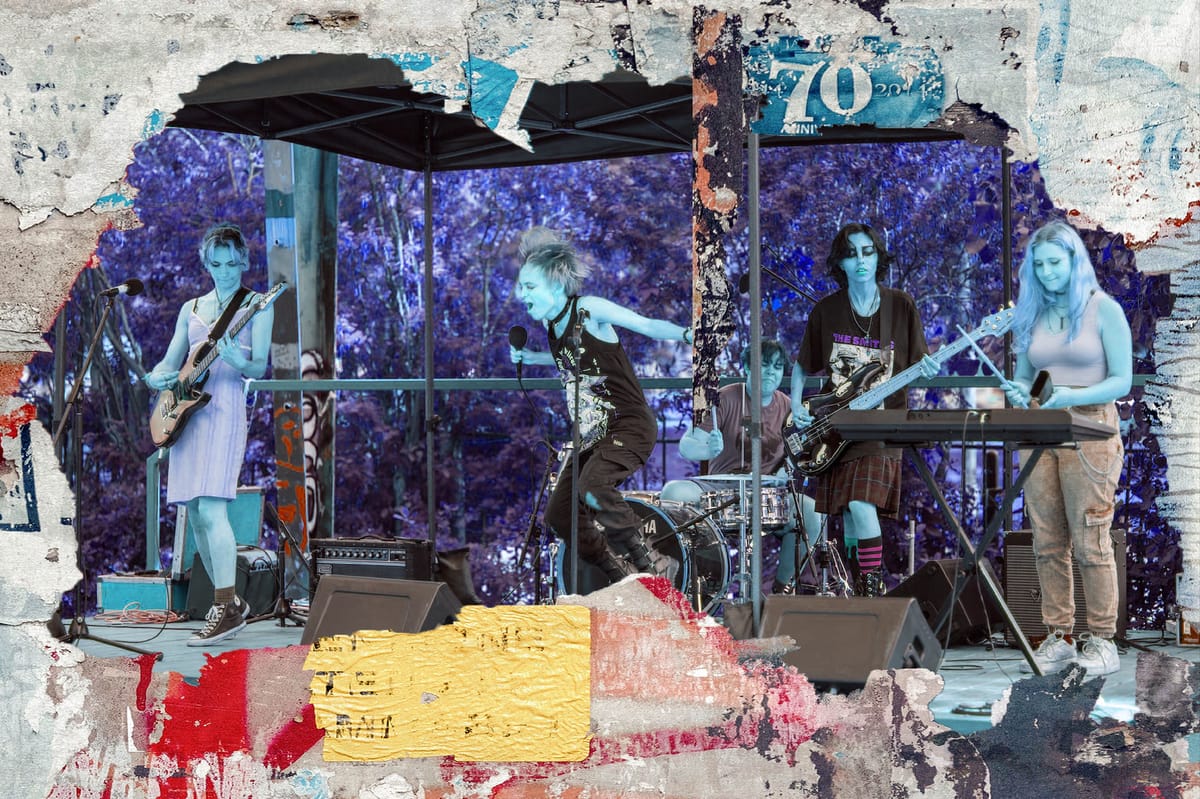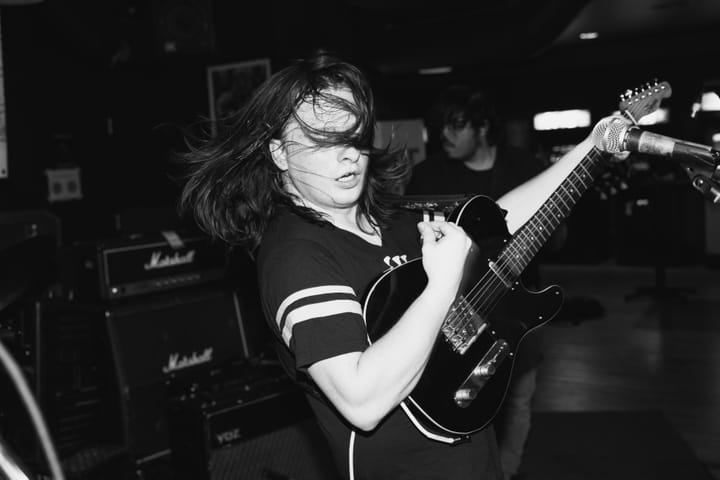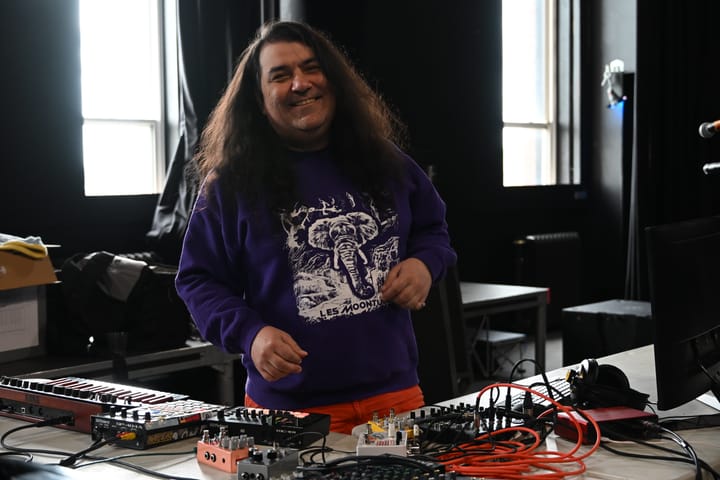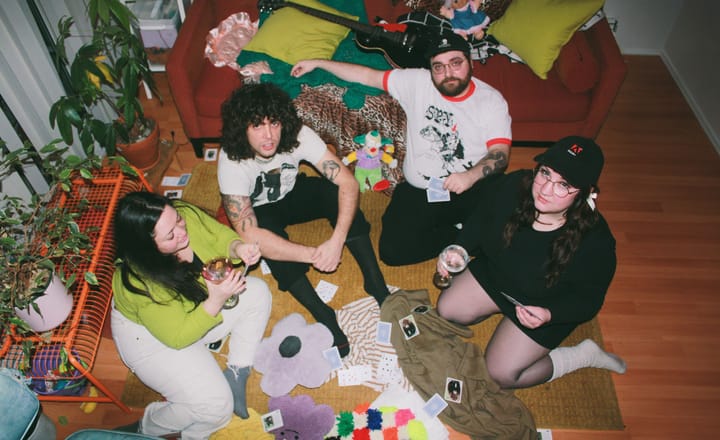
They’re the Stars: Montreal's Rock Camp Empowers Queer and Trans Youth
If you pass by Montreal’s Turbo Haüs on the first weekend of August, you’re likely to hear some raucous punk songs bursting forth from the packed venue — typical for the longstanding bar. But if you step inside, you might be surprised at who’s screaming into the mic.
The performers won’t be grizzled punk bands with a lifetime of DIY gigs under their belts — instead, you’ll find queer and trans kids, decked out in chains, mesh and makeup, shredding and showing off their chops.
Turbo Haüs hosts the annual end-of-camp showcase for Rock Camp Montreal (RCM), a week-long program for girls, non-binary and gender-non-conforming youth between ages 10 and 17, where campers form bands and write original music, culminating in a final live performance.
The Montreal camp has been running for fifteen years — a feat, for a grassroots organization with little funding — and as anti-2SLGBTQ+ policies are increasingly enacted across the country, particularly policies targeting queer and trans youth, it’s only becoming a more necessary project.
“You don’t encounter a lot of non-mixed spaces, especially for youth,” says Silas Dixon, VP on the RCM Board, referring to spaces like Rock Camp that are only open to people with marginalized genders. Dixon first became involved in RCM in 2022, intrigued by word of mouth. “The way people talked about it made it sound like an emotional experience,” he explains.
Every year, thirty to forty youth sign-up for camp and are placed into bands by the camp leadership, before the week of programming begins. Kids are distributed into bands based on age and instrument — each band has the basic rock group configuration of vocals, guitar, bass, and drums. Most of the campers are new to their instrument.
“A lot of them come in with little experience, or will just be fans of music, and mostly come to the space because they want to engage with kids who are similar to them,” Dixon explains. Because the camp is specifically oriented to alternative forms of music like punk, it attracts kids with common interests. “It’s very weird-kid-friendly,” Dixon adds.
Eight years ago, Saz Zenetzis sought out the camp online. They had grown up playing drums and knew they wanted a summer camp with a rock focus, but got a lot more than expected from RCM.
“I fell in love with it immediately,” Zenetzis says. “It was my first introduction to queer and trans people — even at the age of 16 I didn’t have any mentors in that way.”
Though the practical goal of a week at camp is for each band to write one original song they can perform at the showcase, the broader aim is to provide education in grassroots feminist arts and politics. Depending on the programming, campers attend workshops in zine making, girls rock history, queer sex ed and more.
“I genuinely learned so much about women in rock and how queer people can be rockstars too,” Zenetzis, who is now a volunteer at the camp, recalls. Rock camp introduced them to the often-unsung Black, queer and feminist histories of rock music, like guitar innovator Sister Rosetta Tharpe and punk icon Poly Styrene.
Rock Camp connects aspiring rockers to the genre’s history, but it also helps them get situated in its present. Zenetzis has played in three bands that emerged in part out of Rock Camp connections. Their current project is the grunge-country project Hundred Footers, all of whose members have been RCM counselors. They’re working on an album and last year released a video for “Dirt Bike,” a sweet, tough lesbian love song with pretty harmonies and muddy guitars.
“When I was a camper, my whole world was these queer people playing music together, girls playing music together, so going out into the real world and seeing what it was like was definitely a shock to the system,” Zenetzis says. But the community they built at Rock Camp helped them find their place within the city’s broader music landscape.
“It put me into this queer, mostly punk circle of Montreal musicians,” Zenetzis explains. “As much as it is dominated by men, the whole Montreal scene, I feel like I’ve found myself in such a sweet spot.”
Hundred Footers are part of an exciting slate of young, women-and-queer led Montreal rock bands, from the goth anthems of Rock Camp alums Têtaards Strippers to the sludgy headbangers of Whoredrobe. RCM supports the scene year-round, with fundraisers and concerts like Youth Attack, which recently presented Inuk singer-songwriter and powerhouse vocalist Niivi, in partnership with feminist collective Les Insoumises. Rock Camp acts as one node in a thriving queer punk network throughout Montreal.
Even if campers don’t go on to be rockstars, Dixon notes that a lot of them end up getting involved in non-music grassroots organizations, like food accessibility collective Midnight Kitchen. “It’s nice to be able to introduce kids to different ways of thinking and what community care looks like,” Dixon says.
That community also extends beyond Montreal: the camp is part of the Girls Rock Camp Alliance, which boasts over 100 members, including camps in Argentina, Ireland, Tokyo and Mozambique. The alliance organizes panels and programming that helps the camps connect to each other, to share resources, curricula and more. It’s an international movement that first emerged out of the third wave feminist politics of the ‘90s: Misty McElroy came up with the idea for a girls rock camp as a Women’s Studies major at Portland State University in 2000, and it didn’t take long before they started popping up in other cities.
In the twenty-five years since then, many North American music scenes and popular music discourse in general have become more inclusive. Though women and queers have always been part of rock’s history, spearheading their own countercultures like riot grrrl and queercore, the idea of a girl with a guitar is now, even in the mainstream, more norm than novelty. There’s also a concerted effort in music journalism to tell the stories of those women and queer people who shaped contemporary music, in books like Sasha Geffen’s Glitter Up the Dark and documentaries like the upcoming Any Other Way: The Jackie Shane Story.
At the same time, that improvement in inclusivity has been accompanied by a sour, curdling backlash, taking aim directly at queer and trans youth. The reactionary right is fighting “woke” — originally a Black term for awareness of systemic injustice, now co-opted as a catch-all bogeyman for the cultural gains of social movements like Black Lives Matter and #metoo. Anti-trans movements are at the forefront of this creeping fascism.
In Canada, Saskatchewan and New Brunswick have enacted policies that prevent educators from using students’ preferred pronouns without parental consent, while Alberta is planning rollbacks in trans health care and 2SLGBTQ+ education. Recently, over 400 Canadian artists signed an open letter spearheaded by the Tegan and Sara Foundation, standing against these anti-trans policies.
Amidst the rise in hate, RCM provides an essential environment for queer and trans kids to come into themselves. “Having something that caters to them in a positive way is really important,” Zenetzis says. “This is a space where they can be themselves and not be scared of judgment, and have mentors that are just like them, or were just like them.”
“I think having it be a non mixed space allows for people of marginalized genders to really feel comfortable taking up space,” Dixon adds.
Dixon remembers one camper from two seasons back who was especially shy about performing. The camper was the vocalist in one of the bands, and loved to sing, but had intense anxiety about doing it in front of others, even their bandmates.
“It was very difficult for them to get over that fear,” Dixon says. “All of the volunteers really worked with them and all of the campers were very very supportive — I don’t think there was one camper who was upset or rude with them about that.” By the time the showcase came around, the camper was brave enough to take the stage and perform for a packed house. “It was amazing,” Dixon recalls.
Even for campers who are less shy to begin with, the showcase is a kind of coming out moment: a chance for every kid to have their moment in the spotlight. The camp brings in hair and makeup artists, to make sure the campers are glammed up for their big night.
“[They] really make you feel like you’re a star before you get on stage. That was so so special,” Zenetzis remembers. “Especially [for] queer and trans kids that don’t have these opportunities, to feel like they’re the star.”
The campers also record their original songs, so that they live on past the final performance. Listening to the 2023 comp on Bandcamp, what comes through across the six songs is a sense of freedom: the campers aren’t afraid to get weird, or silly, or angry.
Take “My Cat” by Zero Gravity, for example, a sparse, disaffected tune about feeling a sense of chaos. Initially cool and grounded, during the bridge, the song veers off into spoken-word surrealism: “Giraffe in a skirt / the earth is flat / sunset in the morning / shoes made of hat,” the vocalist intones, matter of fact.
“Perfect Me” by Blank Atlas puts the camp’s political education to good use, beginning as a languid, 60s-inflected ballad, before taking a sharp left turn toward feminist rage: “Stop, wake up!” someone yells, jolting the band into a “We Will Rock You” chant. “I don’t wanna be in your society / yeah it just gives me major anxiety / please keep your hands off our freakin’ bodies!” the band yells in assertive protest.
Zenetzis worries about the camp’s future, as a small organization that receives little government funding. As a volunteer, they have been able to encounter first-hand how hard it is to keep a program like RCM going.
“It’s a lot of people scrambling to the best of their ability, doing unpaid work at the end of the day for something they really believe in,” Zenetzis says. They would love to see a version of the camp that lasts longer than one week, but that’s not something RCM has the resources for, at least for now. “We don’t get a lot of money and that’s fine,” Zenetzis adds. “We’re not doing it for the money. It’s for the kids.”
Read more

Sentries: Multifaceted Noise Rock

Step Into Little Stone Crow's World

